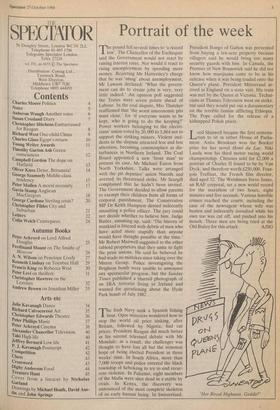Portrait of the week T he pound fell several times to
'a record low'. The Chancellor of the Exchequer said the Government would not react by raising interest rates. Nor would it react to rising unemployment by spending more money. Rejecting Mr Hattersley's charge that he was 'smug' about unemployment, Mr Lawson declared: 'What the govern- ment can do to create jobs is very, very little indeed.' An opinion poll suggested the Tories were seven points ahead of Labour. In the coal dispute, Mrs Thatcher reaffirmed that 'the worst uneconomic pits must close,' for 'if everyone wants to be kept, who is going to do the keeping?' Power workers belonging to the electri- cians' union voted by 20,000 to 3,864 not to support the striking miners. Violent inci- dents in the dispute attracted less and less attention, becoming commonplace as dis- turbances in Northern Ireland. The Coal Board appointed a new 'front man' to present its case, Mr Michael Eaton from North Yorkshire. Talks were arranged with. the' pit deputies' ' union Nacods and averted its threatened strike. Mr Scargill complained that he hadn't been invited. The Government decided to allow parents to exempt their children from all forms of corporal punishment. The Conservative MP Dr Keith Hampson denied indecently assaulting a police officer. The jury could not decide whether to believe him. Judge Butler, summing up, said: 'The history of mankind is littered with debris of men who have acted more stupidly than anyone would have thought possible at the time.' Mr Robert Maxwell suggested to the other tabloid proprietors that they unite to fight the print unions. He said he believed he had made no mistakes since taking over the Mirror Group. Police investigating the Brighton bomb were unable to announce any spectacular progress, but the Sunday Times published a blurred photograph of an IRA terrorist living in Ireland and wanted for questioning about the Hyde Park bomb of July 1982.
The Irish Navy sank a Spanish fishing boat. Opec ministers wondered how to stop the world oil price sinking, after Britain, followed by Nigeria, had cut prices. President Reagan did much better in his second televised debate with Mr Mondale: as a result, the challenger was thought to • have lost all but the remotest hope of being elected President in three weeks' time. In South Africa, more than 7,000 troops and police entered the black township of Sebokeng to try to end recur- rent violence. In Palermo, eight members of the Mafia were shot dead in a stable by rivals. In Kenya, the discovery was announced of the most complete skeleton of an early human being. In Switzerland,
President Bongo of Gabon was prevented from buying a ten-acre property because villagers said he would bring too many security guards with him. In Canada, the Premier of New Brunswick said he did not know how marijuana came to be in his suitcase when it was being loaded onto the Queen's plane. President Mitterrand ar- rived in England on a state visit. His train was met by the Queen at Victoria. Techni- cians at Thames Television went on strike, but said they would put out a documentary on the terrible famine afflicting Ethiopia. The Pope called for the release of a kidnapped Polish priest.
Lord Shinwell became the first centena- rian to sit in either House of Parlia- ment. Anita Brookner won the Booker prize for her novel Hotel du Lac. Niki Lauda won his third motor racing world championship. Christies sold for £2,000 a portrait of Charles II found to be by Van Dyck, and therefore worth £250,000. Fran- cois Truffaut, the French film director, died aged 52. The Welshman Steve Jones, an RAF corporal, set a new world record for the marathon of two hours, eight minutes and five seconds. Various horrible crimes reached the courts, including the case of the newsagent whose wife was beaten and indecently assaulted while his own toe was cut off, and pushed into his mouth. Three men are being tried at the 'Her Royal Highness. Geddit?'


















































 Previous page
Previous page